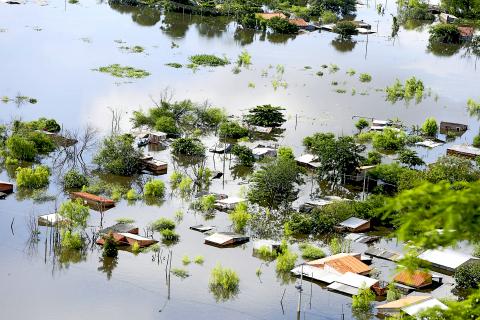More than 100,000 people have had to evacuate from their homes in the bordering areas of Paraguay, Uruguay, Brazil and Argentina due to severe flooding in the wake of heavy summer rains brought on by El Nino, authorities said on Saturday.
In the worst-affected country, Paraguay, about 90,000 people in the area around the capital city of Asuncion have been evacuated, the Asuncion Emergencies Office said.
Many are poor families living in precarious housing along the banks of the River Paraguay.

Photo: Reuters
The Paraguayan government has declared a state of emergency in Asuncion and seven regions of the country to free up funds to help those affected. Several people have been killed by trees falling in the storms that caused the flooding, local media reported. There was no official death toll yet.
In Alberdi, about 120km south of Asuncion, the government recommended that several thousand more people living along the banks of the River Paraguay evacuate.
“[The flooding] was directly influenced by the El Nino phenomenon which has intensified the frequency and intensity of rains,” the national Emergencies Office said.
This year’s El Nino, which sparks global climate extremes, is the worst in more than 15 years, the UN’s World Meteorological Organization (WMO) said last month.
“Severe droughts and devastating flooding being experienced throughout the tropics and sub-tropical zones bear the hallmarks of this El Nino, which is the strongest in more than 15 years,” WMO Secretary-General Michel Jarraud said in a statement.
Officials at Paraguay’s Emergencies Office said the river might rise even more in the coming days, stabilizing and falling back towards normal levels from next month onwards.
In northern Argentina, about 20,000 people have also had to abandon their homes, the government said on Saturday.
“We are going to have a few complicated months, the consequences will be serious,” Corrientes Province Governor Ricardo Colombi said after flying over the worst affected areas with Argentine Cabinet chief Marcos Pena.
Pena said national government aid was already on its way and Argentine President Mauricio Macri intended to make improving infrastructure a priority so that such flooding did not occur again.
“Argentina has a very big lack of infrastructure,” he said.
Macri was due to visit the flooded areas yesterday.
In Uruguay, more than 9,000 people have had to flee their homes, according to the Uruguayan Emergencies Office, which added that it expected water levels to remain at their current level for several days before subsiding.
At least four people have died in Argentina and Uruguay due to the storms and floods, according to local media reports.
One was reported to have drowned while another was electrocuted by a fallen power cable.
Brazilian President Dilma Rousseff also flew over the flooded areas on the border with Argentina and Uruguay on Saturday morning. Rio Grande do Sul state civil defense said 1,795 people were left homeless there after 38 towns were affected by heavy rains.

Taiwan is gearing up to celebrate the New Year at events across the country, headlined by the annual countdown and Taipei 101 fireworks display at midnight. Many of the events are to be livesteamed online. See below for lineups and links: Taipei Taipei’s New Year’s Party 2026 is to begin at 7pm and run until 1am, with the theme “Sailing to the Future.” South Korean girl group KARA is headlining the concert at Taipei City Hall Plaza, with additional performances by Amber An (安心亞), Nick Chou (周湯豪), hip-hop trio Nine One One (玖壹壹), Bii (畢書盡), girl group Genblue (幻藍小熊) and more. The festivities are to

Auckland rang in 2026 with a downtown fireworks display launched from New Zealand’s tallest structure, Sky Tower, making it the first major city to greet the new year at a celebration dampened by rain, while crowds in Taipei braved the elements to watch Taipei 101’s display. South Pacific countries are the first to bid farewell to 2025. Clocks struck midnight in Auckland, with a population of 1.7 million, 18 hours before the famous ball was to drop in New York’s Times Square. The five-minute display involved 3,500 fireworks launched from the 240m Sky Tower. Smaller community events were canceled across New Zealand’s

‘IRRESPONSIBLE’: Beijing’s constant disruption of the ‘status quo’ in the Taiwan Strait has damaged peace, stability and security in the Indo-Pacific region, MOFA said The Presidential Office yesterday condemned China’s launch of another military drill around Taiwan, saying such actions are a “unilateral provocation” that destabilizes regional peace and stability. China should immediately stop the irresponsible and provocative actions, Presidential Office spokeswoman Karen Kuo (郭雅慧) said, after the Chinese People’s Liberation Army (PLA) yesterday announced the start of a new round of joint exercises around Taiwan by the army, navy and air force, which it said were approaching “from different directions.” Code-named “Justice Mission 2025,” the exercises would be conducted in the Taiwan Strait and in areas north, southwest, southeast and east of Taiwan

UNDER WAY: The contract for advanced sensor systems would be fulfilled in Florida, and is expected to be completed by June 2031, the Pentagon said Lockheed Martin has been given a contract involving foreign military sales to Taiwan to meet what Washington calls “an urgent operational need” of Taiwan’s air force, the Pentagon said on Wednesday. The contract has a ceiling value of US$328.5 million, with US$157.3 million in foreign military sales funds obligated at the time of award, the Pentagon said in a statement. “This contract provides for the procurement and delivery of 55 Infrared Search and Track Legion Enhanced Sensor Pods, processors, pod containers and processor containers required to meet the urgent operational need of the Taiwan air force,” it said. The contract’s work would be